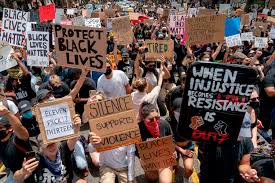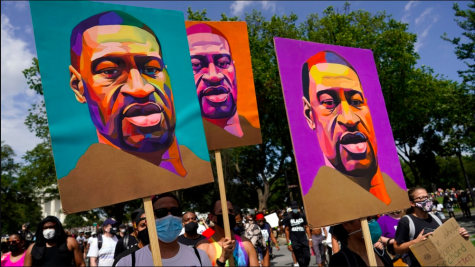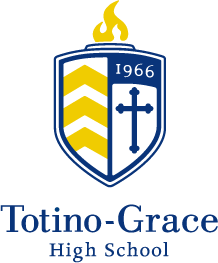Students speak out at Totino-Grace
Students express disapproval over lack of racial and cultural awareness

November 8, 2020
Since the death of George Floyd in May of 2020, Minnesota has been forced to visualize the effects of centuries of systemic oppression, and oftentimes passive-aggressive yet blatant racism. For years, people of color in Minnesota have been ignored when their cries for help were met with the disillusionment of white Minnesotans considering Minnesota to be a “northern state” and therefore cleansed of its sins.
Evidently, the data says otherwise.
Minnesota cities and counties paid over $60.8 million in police misconduct cases from 2007-2017. The MPD kills black Minnesotans at a rate 7 times that of white Minnesotans. Minnesota ranks 2nd in the nation for worst median income and homeownership gaps between white and black residents. As of January 2020, Minnesota ranks 45th out of 51 states when it comes to racial integration, making it one of the most segregated states in the entire country.
Private high schools in Minnesota, more specifically near the Twin Cities, have been in the spotlight after a news article was published by City Pages titled: “Black at Benilde: Black students at elite private school recommend enrolling elsewhere.”
Due to the continuous lack of representation, general lack of cultural awareness, and overall tokenism of students of color, students at Benilde St. Margaret took an active stand against the school’s passive stance towards racism.
This issue is not foreign to students of color at TG.
At Orientation Day, Totino-Grace made it an intention to claim “all students matter;” as well as the notion that they were “making changes to better evaluate our school.”
All three administration representatives interviewed, Dean of students, Andrew Blake, Principal, Cheri Broadhead, and President, Craig Junker, unanimously agreed that sufficient changes were actively being made to better the Totino-Grace Environment.
However, differing opinions exist in terms of whether or not trust was an issue between the student body and the administration.
President of Totino-Grace, Craig Junker, said upon being asked whether the administration was concerned at all about the level of trust between the student body and the administration in terms of belief in their ability to handle these types of situations, he responded, “That’s a good question. I don’t know if there’s a lack of trust. No. Am I concerned about what students think? I’m always concerned with what students think. I’m concerned with how students think of themselves, with how students think of the administration, and how students think of their teachers. I’m always concerned with their experiences at our school,” he continued, “I want to earn that trust, by listening, by making students feel loved, feel welcomed, feel directed towards the path God has for them.”
This, however, directly contradicts a survey conducted with twelve students at random that showed that upon being asked whether they believed TG and TG administration would properly handle racially charged events, nine reported no. And with students of color, this number increased to over 11 reporting they did not trust TG and TG Administration.
Additionally, students were asked what changes they had seen in the four weeks that they had been back in school, and nine reported very little to nothing. This number also increased with students of color, with all reporting no change in terms of racial education or cultural awareness.

When asked about the changes created after the killing of George Floyd, Dr. Junker said, “I think we’ve done a lot and it’s not just since George Floyd,” referencing the creation of SOURCE, a club at TG established as a place for students of color to meet and celebrate their culture, as well as discuss racial issues.
He also mentioned the intention of organizing a curriculum review later this year, as well as organizing future retreats focused on teaching individuals the importance of courageous leadership. President Junker also referenced the future of TG and its hiring practices.
Additionally, he intends on creating a committee focused on better handling racial issues, as well as TG’s in-school environment. President Junker also made an effort to recognize the administration’s focus on listening and being available for all students.
As positive as all of these contributions may seem, almost all of the changes hadn’t actually even happened yet. The curriculum review is supposedly scheduled to occur later this year. Both the Cultural Commission as well as the leadership retreats are both currently under consideration.
Many students, both white and non-white, were skeptical about returning to school due to COVID-19. TG addressed this issue by requiring masks, setting seating regulations, and reducing the number of students per classroom, as well as providing an online alternative.
Along with the fear of the effects of a global pandemic, students of color were also forced to sit alongside fellow students who had expressed blatant hate on social media just weeks prior. Explicitly calling Black Lives Matter a terrorist organization, or joking about the death of George Floyd, were just a few examples.
The administration prepared prior to the school year for these issues by “listening”.
Although TG has several areas that need addressing, some positive efforts have also been made.
SOURCE is a start, but SOURCE is also an example of how students of color are forced to rely on each other rather than become integrated into the community at TG. And SOURCE has done a lot for students in terms of allowing a space to express themselves, but for many, this is the only place in school where they feel this way.
 Katie Koessler, a science teacher at TG, has been a leader largely responsible for SOURCE’s ability to thrive. TG should look to teachers like Ms. Koessler, as she is not only willing to listen and be an ally for racial and gender equality but also actively supports her students by taking into consideration their mental health and personal situations when grading and assigning work. Ms. Koessler is seen as a crucial part of the support system by students of color at Totino-Grace and is a beacon of hope for TG’s future.
Katie Koessler, a science teacher at TG, has been a leader largely responsible for SOURCE’s ability to thrive. TG should look to teachers like Ms. Koessler, as she is not only willing to listen and be an ally for racial and gender equality but also actively supports her students by taking into consideration their mental health and personal situations when grading and assigning work. Ms. Koessler is seen as a crucial part of the support system by students of color at Totino-Grace and is a beacon of hope for TG’s future.
Dean of Students, Andrew Blake, also referenced in an interview that a change to the handbook was made to allow women of color the choice to wear culturally relevant and protective headwear. This was seen as a win for students pushing for cultural recognition on campus.
Blake also mentioned the new addition added to the annual coaches’ meeting, which covered racial issues. In addition teachers and staff read books and articles over the summer discussing race and inequality in our country.
Principal Cheri Broadhead also added that of the 97 teachers and staff members on campus, around 20-30 teachers took a course on cultural competency over the summer.
Teachers at TG are also a critical perspective on this issue.
A survey conducted with six teachers and staff at random reported that four out of six felt TG Administration was capable of handling racially charged events.
This number, however, decreased to 3 out of 6, when teachers and staff were asked whether they believed TG was a safe place for students of color. Many referenced instances they had seen and the general racial climate at TG.
Evidently, TG has an issue of communication between the administration and the student body, but more specifically with students of color.
Diversity is another issue at TG.
Although within the last six years diversity has risen from 12% to 30%, students of color are still facing the lack of integration and the seeming lack of accountability from the administration.
When asked about the factors that contribute to the lack of diversity at TG, President Junker responded, “…we’re not as homogenous as we used to be. We’re much more diverse; in terms of economic diversity, as well. I’d actually say that it’s the opposite of that question. You know, we’re more diverse today than a short time ago, and I think that’s a point of pride that the administration has, and I think our teachers have, and our board has. We’re excited about that.”
Although this is clearly positive progress, the school’s current racial makeup is 70% white. Generally speaking, this may not be seen as an accomplishment when most students of color are forced to a reality of marginalism.
Minnesota seemingly lacks diversity as a whole, but more than anything, Totino-Grace’s reputation appears to hurt it the most.
Pillar Kollie, a junior at Totino-Grace, said upon being asked about her experience at TG as a black woman, “they try to push the narrative that everyone matters at TG, but if you’re black and not an athlete, you exist only in the shadows.”
Principal Cheri Broadhead suggested in an interview, “One of the things we have been talking about is how do we encourage our own graduates of color to come back and be teachers. I think that’s our best chance at success because you know the culture, you hopefully have good relationships with people here.”
Under practical terms, this would make sense.
But of the students of color interviewed, all reported they would not return to TG to teach either due to fears of being unwelcome, a lack of respect from the white student body, or a sense of those emotions currently.
After May of last spring, the administration and counseling department sent out emails suggesting a source of support given the aftermaths of the killing of George Floyd. The message was general and meant to apply to all students.
The counseling department offered an anxiety screening.

Currently, on Totino-Grace’s website, there is no outline of support or plan of action to handle racism on campus. There is, however, a plan outlining how TG is handling Covid-19 and in-person classes.
The issues are evident and the reality is clear. Totino-Grace has an issue in regards to racism, and the overall environment fostered in the average school day.
But if the administration and TG as a whole are willing to acknowledge the issues happening within its walls, and take responsibility for the wrongdoings of the past and present, many solutions may not be difficult to achieve.





Sandye Cole • Nov 21, 2020 at 12:17 am
WOW ~ what a very thoughtful, well written & informative article! I’m extremely impressed by the facts revealed and the author’s very candid point of view! As a young woman of color, I’m convinced the author is uniquely qualified to express such opinions. I’m a much older woman of color who has lived in Florida most of my life, (then Japan, Hawaii & Virginia), and I have dealt with various forms of racism all of my 67 years!!! Since I have never even visited Minnesota, I have no idea the level of racism experienced “up north” but my heart goes out to young people everywhere who are faced with yet another obstacle as they endeavor to become productive members of society. I am slightly biased in my reaction to this article because the author IS my goddaughter, I love her dearly & will always support her!!! One day soon, she just might become what I have called her most of her life: “the best attorney in the whole wide world” OR whatever she sets her mind to become!!! God bless you Leyla: stay strong, outspoken & respectful. You know that Sassy has your back!!!
adviser • Oct 1, 2021 at 7:53 am
Hi Sandye,
I’m just noticing your comment now. Thanks for sharing it. Yes, Leyla is a talented young adult who will positively impact her community and ours. I know it.
Daniel J Felton • Nov 18, 2020 at 9:41 pm
I’m an alum of color. I’d love to continue the discussion if you would like to take next steps in making change happen. We are out here and you are not alone. Thank you!
Nora Flom • Nov 18, 2020 at 10:11 am
I so appreciate your perspective. We have a lot of work to do. Thank you for raising our awareness.
Tom Kocon • Nov 11, 2020 at 2:04 pm
Leyla,
Thanks for speaking your mind on this issue.